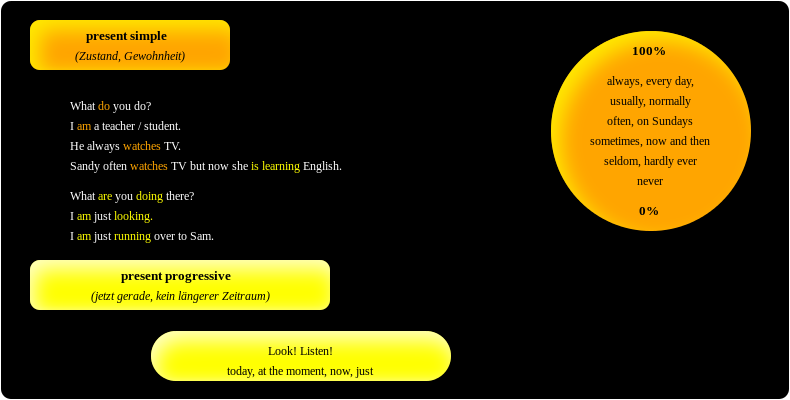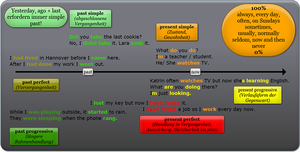Present Progressive/Kontrastierung: Unterschied zwischen den Versionen
K (→On the beach) |
(+Vorlage) |
||
| Zeile 4: | Zeile 4: | ||
{{Achtung| | {{Achtung-en| | ||
Remember? Use the [[Englisch/Grammatik/Tenses/Present Progressive|Present Progressive]] for actions which happen now and the [[Englisch/Grammatik/Tenses/Present Simple|Present Simple]] for regular actions. | Remember? Use the [[Englisch/Grammatik/Tenses/Present Progressive|Present Progressive]] for actions which happen now and the [[Englisch/Grammatik/Tenses/Present Simple|Present Simple]] for regular actions. | ||
}} | }} | ||
| Zeile 23: | Zeile 23: | ||
He <span style="background:orange">usually</span> ''comes'' home at 3.15. | He <span style="background:orange">usually</span> ''comes'' home at 3.15. | ||
</div> | </div> | ||
=== In the afternoon === | === In the afternoon === | ||
'''Write in the correct forms - present simple or present progressive.''' | |||
<div class="lueckentext-quiz" lang="en"> | <div class="lueckentext-quiz" lang="en"> | ||
<span style="background:orange">Every afternoon</span> he ''does (do)'' his homework. It is 4 o'clock. He ''is doing (do)'' it <span style="background:yellow">now</span>. | <span style="background:orange">Every afternoon</span> he ''does (do)'' his homework. It is 4 o'clock. He ''is doing (do)'' it <span style="background:yellow">now</span>. | ||
| Zeile 41: | Zeile 43: | ||
Every evening David ''cleans (clean)'' his teeth. After that he <span style="background:orange">always</span> ''goes (go)'' to bed. | Every evening David ''cleans (clean)'' his teeth. After that he <span style="background:orange">always</span> ''goes (go)'' to bed. | ||
</div> | </div> | ||
{{Show-Hide| | |||
<span style="background:orange">Every afternoon</span> he ''does (do)'' his homework. It is 4 o'clock. He ''is doing (do)'' it <span style="background:yellow">now</span>. | |||
In the afternoon the children <span style="background:orange">often</span> ''play (play)'' football. | |||
He ''is playing (play)'' it just <span style="background:yellow">now</span>. | |||
Then the Millers <span style="background:orange">usually</span> ''have (have)'' dinner. | |||
<span style="background:yellow">Today</span> they ''are having (have)'' Chinese food. | |||
It is 7 o'clock <span style="background:yellow">now</span> and David ''is watching (watch)'' TV. | |||
He ''watches (watch)'' TV <span style="background:orange">every evening</span>. | |||
Every evening David ''cleans (clean)'' his teeth. After that he <span style="background:orange">always</span> ''goes (go)'' to bed. }} | |||
=== On the beach === | === On the beach === | ||
| Zeile 51: | Zeile 67: | ||
Three teenagers ''are playing (play)'' beach volleyball. They ''practive (practice)'' <span style="background:orange">two times a week</span>. | Three teenagers ''are playing (play)'' beach volleyball. They ''practive (practice)'' <span style="background:orange">two times a week</span>. | ||
</div> | |||
{{Show-Hide|<span style="background:yellow">Look</span>, the family ''is playing (play)'' with the ball. They ''come (come)'' to the beach <span style="background:orange">very often</span>. | |||
<span style="background:yellow">Listen</span>! Becky ''is listening (listen)'' to the radio. Her favourite radio station <span style="background:orange">always</span> ''plays (play)'' good music. Simon <span style="background:orange">usually</span> ''reads (read)'' a book on the beach. He ''is doing (do)'' that <span style="background:yellow">at the moment</span>. | |||
In the background a man ''is now diving (<span style="background:yellow">now</span>, dive)'' into the sea. Ben who ''is lying (lie)'' on his surfboard ''shouts (shout)'': "What ''are you doing(you, do)''? I'm falling into the water!" | |||
Three teenagers ''are playing (play)'' beach volleyball. They ''practive (practice)'' <span style="background:orange">two times a week</span>.}} | |||
{{Tenses}} | |||
{{SORTIERUNG:{{SUBPAGENAME}}}} | {{SORTIERUNG:{{SUBPAGENAME}}}} | ||
Version vom 16. November 2018, 15:20 Uhr
Die konsequente Verwendung der Zeiten wird dadurch erschwert, dass es die Verlaufsform (Present Progressive) im Deutschen so nicht gibt. Deshalb muss klar analysiert werden, ob Handlungen und Tätigkeiten regelmäßig stattfinden oder ob betont werden soll, dass etwas gerade oder nur vorübergehend geschieht.
Remember? Use the Present Progressive for actions which happen now and the Present Simple for regular actions.
Interaktive Übungen
A day with David
Every day David gets up at 7 o'clock.
It is 7 o'clock. David is getting up now.
David always goes to school at 8 o'clock. It is 8 o'clock now. David is going to school.
Before he goes to school, he always puts on his school uniform. He is putting it on now.
It is 3 o'clock now. He is coming home from school.
He usually comes home at 3.15.
In the afternoon
Write in the correct forms - present simple or present progressive.
Every afternoon he does (do) his homework. It is 4 o'clock. He is doing (do) it now.
In the afternoon the children often play (play) football. He is playing (play) it just now.
Then the Millers usually have (have) dinner. Today they are having (have) Chinese food.
It is 7 o'clock now and David is watching (watch) TV. He watches (watch) TV every evening.
Every evening David cleans (clean) his teeth. After that he always goes (go) to bed.
On the beach
Look, the family is playing (play) with the ball. They come (come) to the beach very often.
Listen! Becky is listening (listen) to the radio. Her favourite radio station always plays (play) good music. Simon usually reads (read) a book on the beach. He is doing (do) that at the moment.
In the background a man is now diving (now, dive) into the sea. Ben who is lying (lie) on his surfboard shouts (shout): "What are you doing(you, do)? I'm falling into the water!"
Three teenagers are playing (play) beach volleyball. They practive (practice) two times a week.
Past Tense:
Present Tense:





